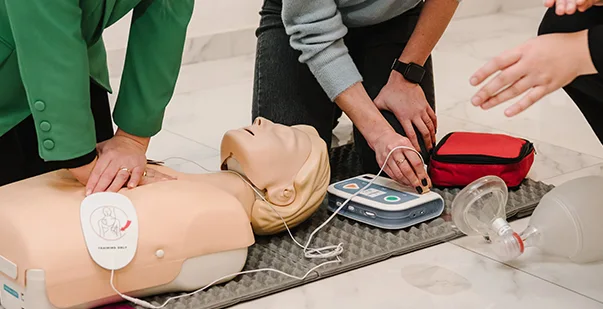Table of Contents
- Understanding BLS Certification
- Components of BLS Certification
- Why is BLS Certification valuable
- Career path with a BLS Certification
- Validity of BLS Certification
- When and how to renew BLS Certification
- Importance of renewal of BLS Certification
- Steps for renewal of BLS Certification
- Conclusion
BLS Certification stands for Basic Life Support Certification. It is a course that prepares you to assist during a medical crisis. Various areas covered are cardiopulmonary resuscitation and how to use an automatic external defibrillator when the heart stops working or a person is having difficulty breathing.
These skills assist you in saving lives. Additionally, there are many jobs that require BLS Certification. Having this credential makes you feel more confident and also shows that you’re dedicated to your patients. Whether you are new to healthcare or experienced, BLS empowers you to go to work knowing that you’re prepared to handle the most pressing situations.
So learn about BLS certification in depth here.
Master BLS Now
Get BLS certified with confidence
Components of BLS certification
A BLS certification typically includes the following components:
-
Cardiopulmonary Resuscitation (CPR):
This involves chest compressions and rescue breaths to help restore breathing and blood flow.
-
Automated External Defibrillator (AED) Use:
This involves the correct use of an AED to deliver an electric shock to restore a regular heartbeat.
-
Airway Management:
Techniques like head-tilt/chin-lift and jaw-thrust to ensure the airway is open for proper breathing.
With all these skills, BLS-certified individuals are equipped to provide immediate and crucial care.
Why is BLS Certification Valuable?
BLS certification is a crucial qualification that offers several benefits. Here’s why it holds significant value:
-
Essential for many healthcare roles:
When asking, “What jobs can I get with a BLS certification?” The answer often starts with healthcare roles. Many healthcare positions mandate BLS certification as a basic safety requirement to ensure employees can handle emergencies effectively.
-
Boosts job security:
With a BLS certification in hand, you’re instantly a more attractive candidate to employers. This strengthens your job security.
-
Supports career growth:
BLS is required for several jobs. In some professions, BLS certification serves as a stepping stone toward more advanced roles or better-paying jobs.
Career Paths with a BLS Certification
Now, let’s explore some of the rewarding jobs you can get with BLS certification:
-
Emergency Medical Technician (EMT):
As an EMT, you’re on the front lines, responding to emergencies and providing immediate care. A BLS certification is the foundation for this role.
-
Paramedic:
Paramedics go beyond EMTs with more advanced medical training, but BLS certification is a key step toward this career.
-
Registered Nurse (RN):
RNs provide comprehensive care in hospitals, clinics, and other healthcare settings. While it’s not always mandatory, many employers prefer RNs who are BLS-certified.
-
Nursing Assistant:
Nursing assistants help RNs and licensed practical nurses (LPNs) with hands-on patient care. Having a BLS certification is especially beneficial in emergency care facilities.
-
Phlebotomist:
Phlebotomists specialize in drawing blood for testing. While not always required, having a BLS certification is a plus, particularly when working with high-risk patients.
-
Healthcare Administrator:
Overseeing the operations of healthcare facilities, administrators benefit from having a BLS certification, even if it’s not directly related to their job—it reflects a commitment to patient safety.
-
Fitness Instructor:
In gyms and health clubs, emergencies can happen. A BLS certification can prepare fitness instructors to handle medical situations if they arise.
-
Lifeguard:
As a lifeguard, you’re responsible for keeping swimmers safe, and BLS certification is often a must for this role.
-
Social Worker:
Social workers often find themselves in crises. In certain settings, having a BLS certification ensures they’re prepared for emergencies.
-
Teacher:
Teachers may face unexpected medical situations in the classroom. Being BLS certified means they can step up and act when it counts.
Validity of BLS certification
A BLS certification is valid for two years from the issue date. To ensure your skills stay updated and relevant, it’s important to renew it before it expires. This certification not only keeps your skills sharp but also assures employers that you’re fully equipped to handle emergencies.
When and how to renew BLS Certification
It’s important to keep track of the validity and expiration date of the certificate to avoid any lapses in certification.
When to Renew:
A BLS certification lasts two years, so it’s important to renew it before the expiration date.
How to Renew?
Complete a BLS recertification course, which can be done either online or in person. The course typically takes 2-4 hours to refresh your CPR, AED, and airway management skills.
Exam:
Pass the recertification exam to renew your certificate for another two years.
Importance of Renewal of BLS Certification
Renewal of BLS certification is important. It helps in keeping your skills up-to-date and according to the latest guidelines. For instance, changes in CPR compression rates for AED usage protocols may occur, and renewing ensures you’re prepared. Additionally, most healthcare employers require you to maintain a valid certification for job security.
Key benefits of renewal are:
-
Stay Updated:
The medical guidelines for BLS can evolve, and renewal ensures you’re aware of the latest practices.
-
Maintain Confidence:
Regular training helps reinforce your skills, making you more confident in emergencies.
-
Career Requirements:
Many healthcare roles require current BLS certification, so renewal is often necessary for job security and advancement.
Steps of renewal of BLS Certification
To avoid lapses in certification, it’s a good idea to set a reminder for your renewal date. Keeping your BLS certification current is crucial for staying employable in many healthcare roles. Here are the simple steps to renew your BLS certification:
-
Check your expiration date:
Make sure to renew before your current certification expires.
-
Find a BLS recertification course:
You can choose either an online or in-person class through organizations.
-
Complete the course:
The course will review essential skills like CPR and using an AED.
-
Pass the exam:
After the course, you’ll take a written and practical exam to demonstrate your skills.
-
Receive your new certification:
Once you pass, you’ll get a new BLS certificate that’s valid for another two years.
Conclusion
A BLS certification is more than a resume booster. With various jobs that require BLS certification, the future of BLS certification is bright. Whether you want to start a healthcare career or improve your skills for your current job, you need your current BLS Certification. Keeping your certification current is just as important as earning it. So, if you’re approaching your renewal date, take the time to complete the necessary steps and stay updated with the latest techniques. So are you ready to advance your career? Enroll in a BLS certification course today and empower yourself to save lives!







